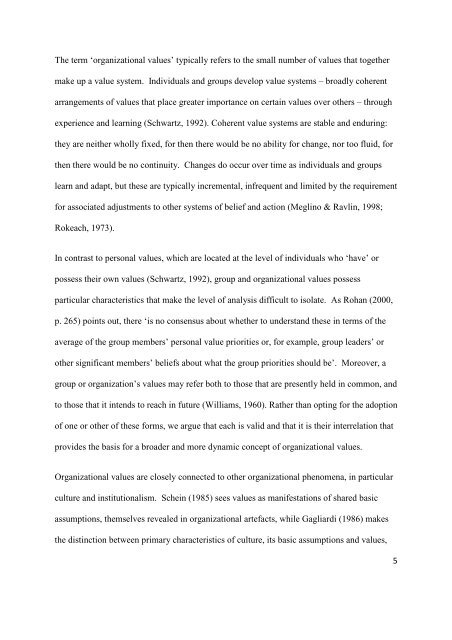Organizational values: A dynamic perspective Abstract Keywords
Organizational values: A dynamic perspective Abstract Keywords
Organizational values: A dynamic perspective Abstract Keywords
Create successful ePaper yourself
Turn your PDF publications into a flip-book with our unique Google optimized e-Paper software.
The term ‘organizational <strong>values</strong>’ typically refers to the small number of <strong>values</strong> that together<br />
make up a value system. Individuals and groups develop value systems – broadly coherent<br />
arrangements of <strong>values</strong> that place greater importance on certain <strong>values</strong> over others – through<br />
experience and learning (Schwartz, 1992). Coherent value systems are stable and enduring:<br />
they are neither wholly fixed, for then there would be no ability for change, nor too fluid, for<br />
then there would be no continuity. Changes do occur over time as individuals and groups<br />
learn and adapt, but these are typically incremental, infrequent and limited by the requirement<br />
for associated adjustments to other systems of belief and action (Meglino & Ravlin, 1998;<br />
Rokeach, 1973).<br />
In contrast to personal <strong>values</strong>, which are located at the level of individuals who ‘have’ or<br />
possess their own <strong>values</strong> (Schwartz, 1992), group and organizational <strong>values</strong> possess<br />
particular characteristics that make the level of analysis difficult to isolate. As Rohan (2000,<br />
p. 265) points out, there ‘is no consensus about whether to understand these in terms of the<br />
average of the group members’ personal value priorities or, for example, group leaders’ or<br />
other significant members’ beliefs about what the group priorities should be’. Moreover, a<br />
group or organization’s <strong>values</strong> may refer both to those that are presently held in common, and<br />
to those that it intends to reach in future (Williams, 1960). Rather than opting for the adoption<br />
of one or other of these forms, we argue that each is valid and that it is their interrelation that<br />
provides the basis for a broader and more <strong>dynamic</strong> concept of organizational <strong>values</strong>.<br />
<strong>Organizational</strong> <strong>values</strong> are closely connected to other organizational phenomena, in particular<br />
culture and institutionalism. Schein (1985) sees <strong>values</strong> as manifestations of shared basic<br />
assumptions, themselves revealed in organizational artefacts, while Gagliardi (1986) makes<br />
the distinction between primary characteristics of culture, its basic assumptions and <strong>values</strong>,<br />
5
















